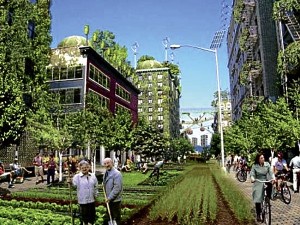Educational sustainability

AGRICULTURAL schools can help cities develop intelligent city farming to include alternatives to rice which can now be used in mushrooming city food outlets. Photo from lushome.com
OUR WORLD now faces four major challenges. These challenges include climate change, the fuel crisis, financial crisis and food crisis.
They say if the glaciers all melt, water level will rise by some seven meters. One-meter rise will inundate big portions of the rice-growing areas along the Mekong River where we get much of our rice. Well over one-half of the world’s diet consists of rice, corn and wheat. About 90 percent in Asia eat rice. Our rice production is vulnerable to weather extremes.
A third of our country’s population falls below the age of 14, and there is a need to prepare them to ably tackle these four challenges. It is a consumer-driven economy because of our healthy population, and yet we are called a labor plus economy. Many young college graduates here cannot find jobs and that situation is also pronounced in a growing number of more developed countries. One out of 10 Filipinos has to work abroad.
Urban farming
This column has tackled urban farming, and will mention this time that small farms are said to be more profitable. Agricultural schools can help cities to develop intelligent city farming to include alternatives to rice which can be used for now in mushrooming city food outlets.
Article continues after this advertisementWe have been engineered to think that to be urbane in a newly emerged economy is to eat at new and popular places, and then to walk across to the gym, the spa, the wellness store. Maybe urbanity can carry us farther to do farming. Composted wet garbage around the house’s perimeter mixed with dried leaves makes very good soil.
Article continues after this advertisementEducation could become a key project element in any land development. Schools and universities could include in their existing curriculum the study of ecological and cultural engagements in their natural and built surroundings.
Water conservation
The importance of planting locally native species in our planned vegetative spaces will teach the youth the value of water conservation. The study of a region’s topography, area geology, views and local materials will enrich their appreciation of environmental and cultural preservation.
Schools first of all should be showcases of ecological and cultural integrity. School authorities cannot go on a do-it-yourself green movement, but will be well-advised to consult with competent professionals to point out to them the advantages and disadvantages of invasive work on the land and built structures.
Design of new buildings must include in the predesign stage a study of context conditions where the site is located.
This could be explained to students for their appreciation and future use. This would include plotting existing waterways, storm water drainage routes to and from off-site areas. Existing vegetation and natural land cover damage control is very important knowledge.
The design of the new building does not stand alone but must relate to swaled, walled, planted, walking, biking and gathering spaces. Existing main streets and cultural landmarks around the site must be appreciated.
Identify surrounding off-site developments and future developments including electromagnetic installations and their impact on health and the learning environment.
Students’ understanding of color, texture, character, functions and patterns in their surroundings can hopefully spur their entrepreneurial spirit, which they say will be the star of the new century.
For comments or inquiries, e-mail amadodejesus@gmail.